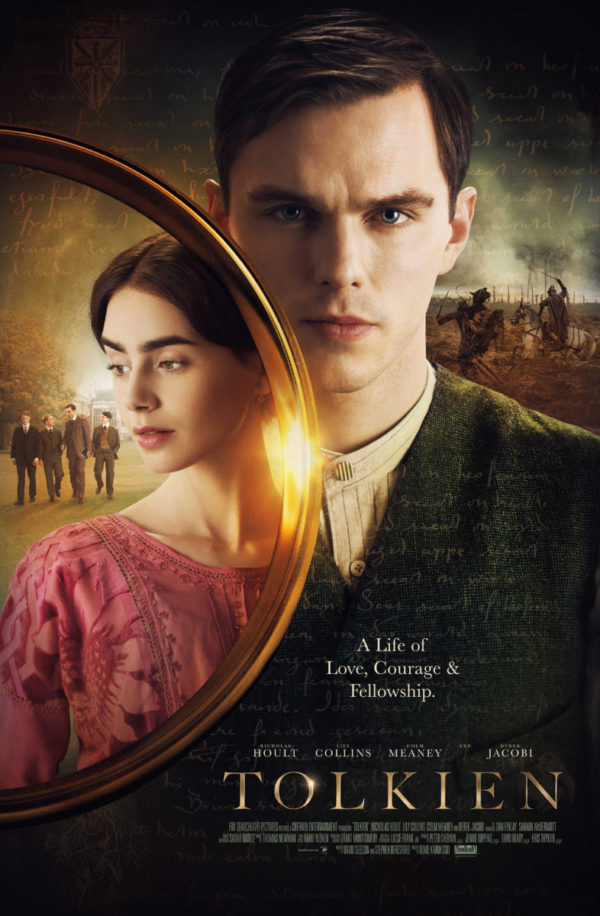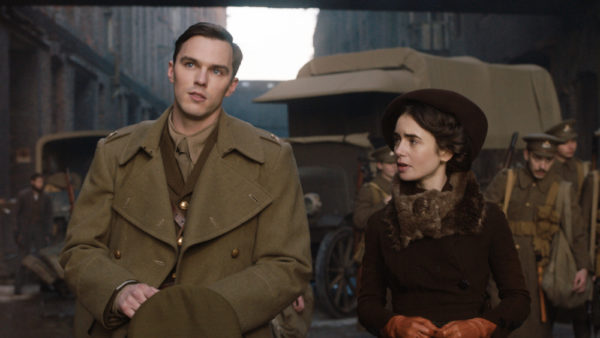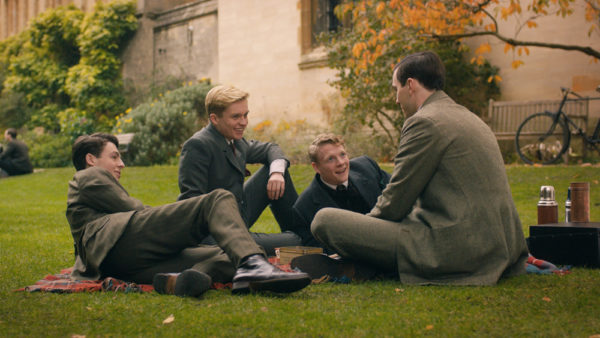Tolkien, 2019.
Directed by Dome Karukoski
Starring Nicholas Hoult, Lily Collins, Genevieve O’Reilly, Colm Meaney, Tom Glynn-Carney, Craig Roberts, Anthony Boyle, Patrick Gibson, Harry Gilby, Laura Donnelly, Derek Jacobi, Pam Ferris, Mimi Keene, Ty Tennant, Aaron Neil, Holly Dempster, Jack Riley, Nia Gwynne, and Owen Teale
SYNOPSIS:
Tolkien explores the formative years of the orphaned author as he finds friendship, love and artistic inspiration among a group of fellow outcasts at school.
“You don’t deserve happiness, you deserve magic”; it’s a romantic sentiment from titular writer J.R.R. Tolkien that also doubles as what devotees of the author’s epic and sprawling body of fantasy work (Lord of the Rings and The Hobbit) deserve as a biopic of his so-called formative years. Instead, director Dome Karukoski (Tom of Finland) has crafted a dry, disjointed, and bland portrait of easily one of the most imaginative minds to ever live with Tolkien, unable to figure out if it wants to focus on Tolkien’s fascination and unparalleled way with languages, the fellowship between his university mates, or a dance with death bursting with hallucinogenic high fantasy inspired imagery during World War I.
The film also mistakes character development and narrative depth as an endless string of moments in time that awkwardly are supposed to lead viewers on as to how various elements of those aforementioned legendary stories came about. The earliest instance sees Tolkien’s mother (before her tragic death rendering him an orphan and mixed up with a higher society that he doesn’t necessarily mesh with well) reading him a bedtime story (complete with shadow puppets for full effect) about a dragon which presumably is supposed to be the reasoning for conceiving and/or implementing Smaug. The problem is that the scene is executed very amateurishly, I’m not sure if I buy into things going down that way, and even if I was able to go along with it, there are countless similar scenes, each one causing eyes to roll farther back into one’s head.
Writers David Gleeson and Stephen Beresford appear to be far more interested in dropping fan service references, but the issue is I’m someone that’s not even that big of a fan of the stories (the movies are fine but never really a saga that truly amped me up with each new installment) with limited knowledge, yet kept catching on to the homages. If it’s not for the diehards, but also driven by interactions shaping the stories, then it’s difficult figuring out who Tolkien is aimed at. That’s not to say every one of these dialogue exchanges is bad, although the most engaging ones come from young adult J.R.R. Tolkien (Nicholas Hoult) and his aspiring pianist crush Edith Bratt (Lily Collins), namely a debate about how words are more than catchy sounds and require meaning. Neither Nicholas Hoult nor Lily Collins gives a performance to remember, but they have chemistry together that makes for a few easily digestible segments (except for when things go full blown sappy near the end).
Played by Harry Gilby as a child, Tolkien develops a bond with a pack of outsiders as unorthodox and artistically minded as himself. More importantly, they are friendships that stand the test of time, from natural arguments that occasionally arise between close compadres to serving alongside one another in World War I. Intriguingly, they are all fixated on different avenues of artistic creativity, ranging from storytelling to poetry to musical compositions and more, but the one thing connecting them all is their grand desire to one day change the world with their art. Unfortunately, it’s a dynamic that is not fully capitalized on, as all of Tolkien’s friends are fairly disposable without any real personalities. Disappointingly, the same could be said for Tolkien himself, as Nicholas Hoult fails to render him as anything but an uninteresting outsider university student with a penchant for studying and creating languages. He’s so flat that it’s nearly impossible to imagine so much magic coming from his mind.
Perhaps what’s most frustrating is that whenever Tolkien does begin to pick up steam, the interactions shift to other supporting characters entirely, and so rapidly so that we never really get attached to any of them, even during the World War I glimpses of Tolkien seemingly on the verge of death desperately searching for one of his friends. By the time he realizes that language is his true calling and vies for the attention of an alternative well-respected teacher, the narrative as a whole has become so fragmented and all over the place, what investment there was is long gone.
There are even subplots within the subplots that are disastrously handled, whether it be friction between Tolkien and Edith after a heated argument over her career aspirations, the brotherhood standing up for themselves against multiple minor characters, and studying languages, which is supposed to be the unique characteristic that makes Tolkien who he is. And then there’s the World War I battle scenes, which are filtered with so much smoke and color that you feel like you are watching Lord of the Rings set inside French trenches in the 1930s. It’s supposed to complement Tolkien’s delirious imaginations that would also go on to shape the stories, but all it really does is make a low-budget come across as so with poorly implemented action that fails to accomplish its narrative goal.
With all that in mind, Tolkien does somewhat work if all one does is cross-analyze every interaction and event with something from his world-renowned stories. The themes here are the same ones firmly rooted in Lord of the Rings, but Tolkien does very little to paint its real-life figures as the extraordinary people they were. Thankfully, Tolkien is not four hours like an actual Lord of the Rings movie, but with such uninspired standard biopic direction, it sure does sometimes feel that long.
Flickering Myth Rating – Film: ★ ★ / Movie: ★ ★
Robert Kojder is a member of the Chicago Film Critics Association and the Flickering Myth Reviews Editor. Check here for new reviews, friend me on Facebook, follow my Twitter or Letterboxd, check out my personal non-Flickering Myth affiliated Patreon, or email me at MetalGearSolid719@gmail.com















